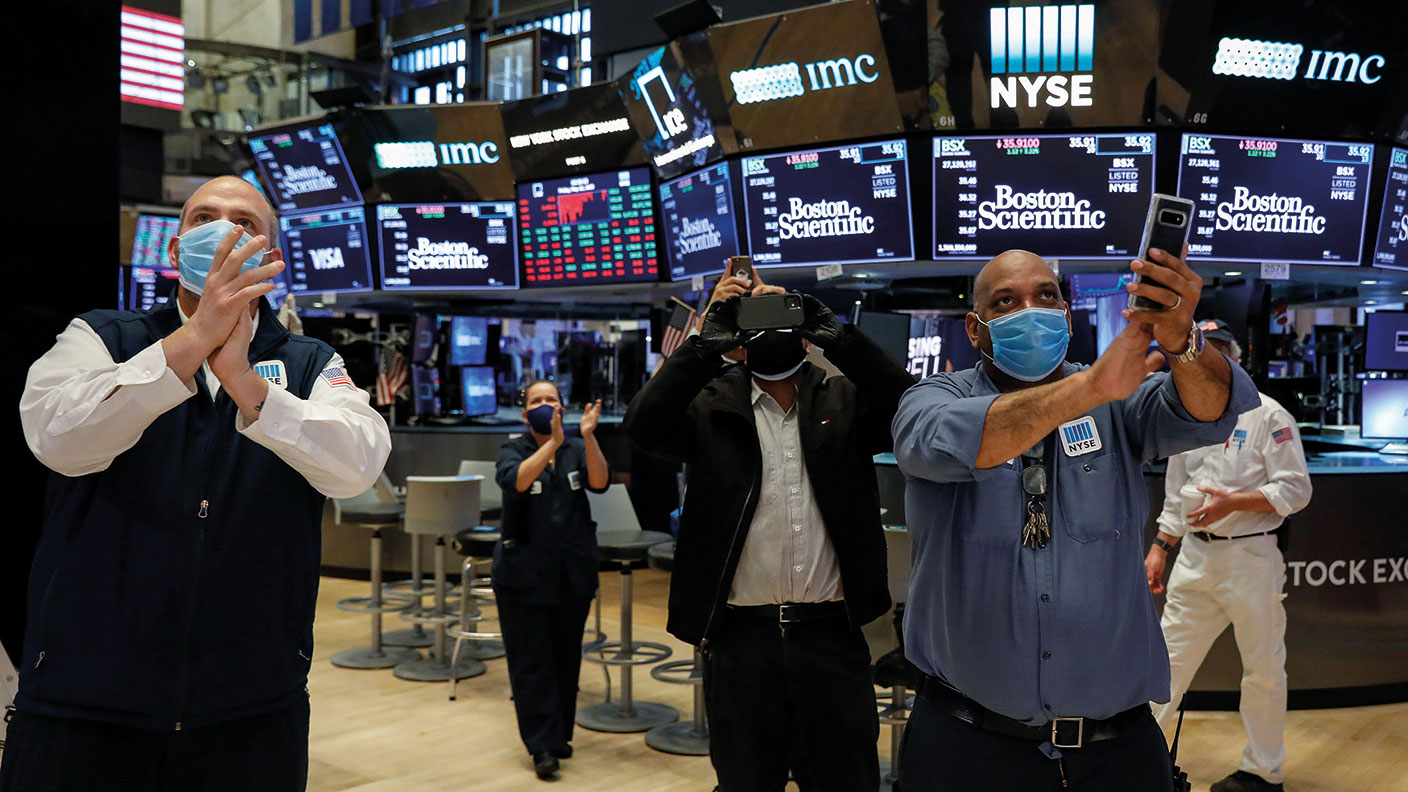Buying foreign shares is easier than you think – here's how to do it
UK investors are increasingly turning their attention to shares listed in the US and beyond. Cris Sholto Heaton looks at five common questions about trading on overseas markets.


Get the latest financial news, insights and expert analysis from our award-winning MoneyWeek team, to help you understand what really matters when it comes to your finances.
You are now subscribed
Your newsletter sign-up was successful
Want to add more newsletters?

Twice daily
MoneyWeek
Get the latest financial news, insights and expert analysis from our award-winning MoneyWeek team, to help you understand what really matters when it comes to your finances.

Four times a week
Look After My Bills
Sign up to our free money-saving newsletter, filled with the latest news and expert advice to help you find the best tips and deals for managing your bills. Start saving today!
Buying foreign shares directly remains a minority sport among British investors. There were around one million trades on overseas exchanges through UK stockbrokers in the last quarter of 2020, compared with around 7.5 million trades in UK securities, according to analysis from Compeer, a benchmarking firm that compiles data for the wealth-management industry. However, this is substantially higher than it was just a couple of years ago, when international trades would never come close to half a million even in a strong quarter.
Even allowing for the fact that many people traded far more than normal in the turmoil of 2020, it’s clear that investors are becoming more willing to invest in overseas stocks than they used to be. Particularly popular international shares such as Tesla now routinely appear in lists of the most actively traded shares at major UK stockbrokers – something that we almost never saw before.
MoneyWeek has always believed that investors should think internationally, so this is a trend that we’re pleased to see (even if we’re not entirely convinced that Tesla is worth 135 times forecast earnings). There’s no real reason why investors should favour UK stocks over major American, European or Asian ones to the extent that they do: it’s a legacy of the time when trading on international exchanges used to be far more difficult and costly and so few private investors did so. If you’re considering investing in overseas stocks for the first time, these are a few of the most useful things to know.
MoneyWeek
Subscribe to MoneyWeek today and get your first six magazine issues absolutely FREE

Sign up to Money Morning
Don't miss the latest investment and personal finances news, market analysis, plus money-saving tips with our free twice-daily newsletter
Don't miss the latest investment and personal finances news, market analysis, plus money-saving tips with our free twice-daily newsletter
What markets can I invest in?
The US, Canada and western Europe are the easiest markets to access. That’s partly because most stocks can be held as Crest Depository Interests (CDIs), which means that the trade can be settled via Crest (the UK’s central securities depository, which keeps shares in electronic form). This is largely invisible to you as an investor, but makes the whole process of trading and settlement much simpler for brokers – they don’t need to have custodians in other countries to hold the stocks on their behalf or to be members of the local securities depository in their own right.
CDIs aren’t available for other major markets, so these require more work and costs for brokers to put trading arrangements in place. Hence most UK brokers don’t offer them and those that do are only likely to bother with a limited number of countries, such as Australia, Hong Kong, Japan and Singapore. The obstacles to dealing in many smaller markets or emerging markets include demand (not enough people are interested for it to be worthwhile), but also sometimes legal restrictions on foreign investors or frictions that make trading more bureaucratic.
For example, China doesn’t let foreigners trade directly in shares listed in Shanghai or Shenzhen (although it is possible to trade some major ones through the Shanghai-Hong Kong and Shenzhen-Hong Kong Stock Connect). India requires foreign individual investors to register with the local authorities and open dedicated accounts with a very limited number of local brokers; it’s bureaucratic and I don’t know anybody who’s done so. Korea and Taiwan are open to foreign investors and have large liquid markets with interesting high-tech companies, but have requirements that make it more of a hassle to trade and demand is not high enough to make this worthwhile for UK-based brokers.
That said, a substantial number of major companies from awkward markets are available as American Depository Receipts (ADRs) listed in New York or Global Depository Receipts (GDRs) listed in London. ADRs and GDRs are securities that give you rights over one or more underlying shares in a company listed on its local stock exchange (including receiving dividends). So while you may not be able to trade directly in Korea or Taiwan through a UK broker, you will be able to buy ADRs in Taiwan Semiconductor Manufacturing or GDRs in Samsung Electronics, or any number of Russian stocks with London-listed GDRs.
Which brokers can I use?
This means that you have a fair amount of choice when it comes to the US and Europe. AJ Bell Youinvest, Hargreaves Lansdown, iDealing, Interactive Brokers, Interactive Investor and Saxo Capital Markets all offer a wide range of markets, while Halifax/iWeb/Lloyds Share Dealing (the same firm under different brands) and IG offer a much more limited range.
Beyond that, the shortlist gets smaller. Interactive Brokers and Saxo offer the major Asian markets for online trading (AJ Bell will trade in them by phone, but with a £10,000 minimum trade size), while Interactive Investor offers Australia, Hong Kong and Singapore (not Japan). Interactive Brokers and Saxo cover most of eastern Europe between them. South Africa is available through AJ Bell (by phone) and Saxo (online), while Interactive Brokers is the only UK-regulated discount broker that trades in Mexico. Many of these markets and perhaps a couple of others may be available through traditional stockbrokers such as Charles Stanley, Killik & Co or Redmayne Bentley – but you will pay substantially higher fees.
Which brokers are cheapest?
It’s impossible to say which of these brokers offers the best value, because that depends on what you need and how you trade, but there is one wrinkle that is worth keeping in mind when comparing costs. While the headline dealing rate for foreign securities is often the same as for UK securities, converting sterling into foreign currency usually comes with a substantial mark-up over the prevailing exchange rate.
Some brokers only allow you to hold sterling in your account, so you have to change currencies every time, while others let you hold foreign currency. If you are going to be trading in and out of shares in the same currency regularly, the ability to keep proceeds in that currency is likely to save on costs over the long term, but if you trade infrequently and hold for longer periods the impact of this may still be outweighed by other costs.
You can expect to pay between 0.5% and 1.5% in foreign exchange (FX) commission – this varies between brokers and will often depend on the size of the trade. The main exception is Interactive Brokers (a large US broker with a UK-regulated arm), which charges only a negligible FX margin and has exceptionally low trading commissions. So if you are looking for the cheapest international broker, it probably ticks that box for most active traders and even some long-term investors. Set against that, it is aimed at experienced investors (so the platform is more complex than most of the other brokers), it does not offer an individual savings account (Isa) and administration fees for a self-invested personal pension (Sipp) are higher than most.
Can I hold foreign shares in an Isa or a Sipp?
Isas and Sipps can be used to shelter you from UK income and capital-gains taxes on foreign shares in the same way as with UK shares. However, the rules for Isas include one awkward restriction: the shares must trade on what HM Revenue & Customs considers to be a recognised stock exchange.
This rather arbitrary status includes most major markets, but has some surprising exclusions and applies to where the underlying security is listed rather than where you trade it. This means that while most foreign shares you buy through a UK broker are likely to be Isa-eligible, you will encounter some major shares that trade in London or New York as GDRs or ADRs that are not. This restriction does not apply to Sipps, which have the ability to hold a much wider range of assets.
Isas are also not permitted to hold foreign currency, so you will have to trade in and out of sterling each time – meaning that FX mark-ups can become pretty significant. Sipps are allowed to hold foreign currency, but not all brokers will support this. Sipps that do so tend to have higher administration fees than those that just allow you to hold sterling.
Will foreign governments tax me on dividends?
While Isas and Sipps save you paying UK income tax, they are of only limited use when it comes to the greatest frustration of international investing: withholding taxes on dividends. Many governments deduct a percentage of every dividend before it’s paid to you. The amount that they are allowed to deduct is capped under tax treaties between the UK and the other country – typical treaty rates are 10% or 15%. However, many countries withhold more (Switzerland takes an extortionate 35%) and tell foreign investors that they can reclaim it if they are entitled to a lower rate.
Needless to say, reclaiming tax from a foreign tax authority is generally a bureaucratic process that is openly designed to minimise the amount of tax that is ever likely to be reclaimed and is rarely worth considering unless you are receiving very substantial dividends. So it’s important to look at foreign dividends net of the withholding tax that you will pay when deciding how attractive they are, and pay particular attention to countries with low, or no, withholding tax.
It would clearly be better if brokers could arrange for dividends to be paid with the right level of withholding tax deducted, but for obvious reasons very few countries have such a helpful system. The notable exception is the US (strangely, given how incredibly dystopian its tax system is in many other ways). If your broker supports it (most do, but not all), completing form W-8BEN will allow your dividends in a regular account or Isa to be taxed at 15% rather than 30%. Some brokers – AJ Bell and Hargreaves Lansdown are examples – can also get tax relief on Canadian shares if you complete form NR301.
If your broker has set up its Sipp arrangements in the optimal way (with US holdings for their Sipp clients separate from other US investments), they will also be able to get US dividends paid with no withholding tax. This is by no means ubiquitous, so check before you open an account because the extra tax savings could be helpful for income investors.
Get the latest financial news, insights and expert analysis from our award-winning MoneyWeek team, to help you understand what really matters when it comes to your finances.

Cris Sholt Heaton is the contributing editor for MoneyWeek.
He is an investment analyst and writer who has been contributing to MoneyWeek since 2006 and was managing editor of the magazine between 2016 and 2018. He is experienced in covering international investing, believing many investors still focus too much on their home markets and that it pays to take advantage of all the opportunities the world offers.
He often writes about Asian equities, international income and global asset allocation.
-
 Early signs of the AI apocalypse?
Early signs of the AI apocalypse?Uncertainty is rife as investors question what the impact of AI will be.
-
 Reach for the stars to boost Britain's space industry
Reach for the stars to boost Britain's space industryopinion We can’t afford to neglect Britain's space industry. Unfortunately, the government is taking completely the wrong approach, says Matthew Lynn
-
 How a dovish Federal Reserve could affect you
How a dovish Federal Reserve could affect youTrump’s pick for the US Federal Reserve is not so much of a yes-man as his rival, but interest rates will still come down quickly, says Cris Sholto Heaton
-
 Why it might be time to switch your pension strategy
Why it might be time to switch your pension strategyYour pension strategy may need tweaking – with many pension experts now arguing that 75 should be the pivotal age in your retirement planning.
-
 Star fund managers – an investing style that’s out of fashion
Star fund managers – an investing style that’s out of fashionStar fund managers such as Terry Smith and Nick Train are at the mercy of wider market trends, says Cris Sholto Heaton
-
 How to add cryptocurrency to your portfolio
How to add cryptocurrency to your portfolioA new listing shows how bitcoin might add value to a portfolio if cryptocurrency keeps gaining acceptance, says Cris Sholto Heaton
-
 Investing in forestry: a tax-efficient way to grow your wealth
Investing in forestry: a tax-efficient way to grow your wealthRecord sums are pouring into forestry funds. It makes sense to join the rush, says David Prosser
-
 The MoneyWeek investment trust portfolio – early 2026 update
The MoneyWeek investment trust portfolio – early 2026 updateThe MoneyWeek investment trust portfolio had a solid year in 2025. Scottish Mortgage and Law Debenture were the star performers, with very different strategies
-
 Pundits had a bad 2025 – here's what it means for investors
Pundits had a bad 2025 – here's what it means for investorsThe pundits came in for many shocks in 2025, says Max King. Here is what they should learn from them
-
 New year, same market forecasts
New year, same market forecastsForecasts from banks and brokers are as bullish as ever this year, but there is less conviction about the US, says Cris Sholto Heaton